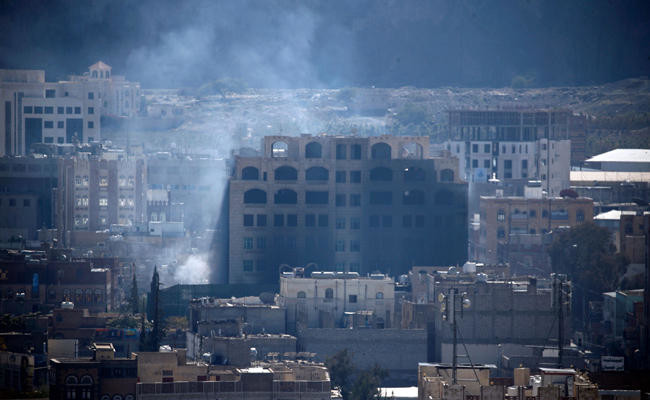SANAA: Gunbattles forced shops and schools to close in Yemen’s capital Sanaa on Sunday as residents warned a three-year rebel alliance was collapsing into a “street war.”
The Iran-backed Houthi rebels’ partnership with former President Ali Abdullah Saleh appeared to have fallen apart after he reached out to a Saudi-led coalition fighting the militia group.
The Houthis’ political office on Saturday accused Saleh of staging a “coup.”
On Sunday, Saleh loyalists cut off a number of streets in central Sanaa and deployed heavily in anticipation of Houthi attacks, as security sources said clashes this week had left some 60 dead across the capital and at its international airport.
Saleh loyalists renewed a bid to seize control of Al-Jarraf district, a stronghold of the Iran-backed Houthis, who fortified their positions with dozens of vehicles mounted with machine guns, witnesses said.
The Houthis, who seized Yemen’s capital in 2014 with the help of Saleh’s forces, are now becoming isolated in the face of popular anger.
Pictures of angry Yemenis tearing down posters of the Houthi leader, Abdul-Malik Al-Houthi, in Sanaa flooded social media as street fighting there appeared to split the capital in two, with northern areas under Houthi control and southern ones under Saleh’s fighters.
Witnesses said the Houthis had brought reinforcements from their northern strongholds and deployed them in the south of the capital.
The Houthis seized the home of rebel Interior Minister Mohammed Abdullah Al-Waqsi, who is close to Saleh, killing three of his bodyguards and detaining others, Saleh sources said.
And Houthi rebels killed Mohammed Al-Zarka, a tribal leader close to Saleh, in Omran just north of the capital and members of his family, the same sources said.
Classes canceled
Sanaa residents said they had barricaded themselves in their homes to avoid snipers and shelling as clashes flared up around key ministries where the two sides had been working together just days before.
The Education Ministry canceled classes Sunday, and witnesses said some bodies of those killed in previous clashes this week were still lying in the streets.
Iyad Al-Othmani, 33, said he had not left his house for three days because of the clashes.
Mohammed Abdullah, a private sector employee, said his street had been cut off by militiamen and he was staying home to avoid checkpoints.
“Sanaa is becoming like a ghost town. There is a street war and people are holed up in their houses,” said an activist who works with the International Organization for Migration in Sanaa.
“If the confrontation continues, many families will be cut off” and stranded in their homes, he warned.
The collapse of the Houthi-Saleh alliance is a key shift in Yemen’s complex war.
The Saudi-led coalition carried out dawn air raids Sunday against Houthi positions in the hills south of Sanaa.
The UAE, which is a key member of the coalition, on Sunday denied a Houthi claim that a missile fired from Yemen reached its air space or threatened a nuclear power plant set to open in 2018.
The Houthis had earlier claimed on their Al-Masirah news channel that they had hit the Barakah plant with a cruise missile fired from Yemen.
A missile fired by the Houthis which was intercepted near Riyadh’s international airport last month prompted the coalition to tighten a blockade against Sanaa airport and rebel-held sea ports.
The Houthis have warned that Saudi Arabia and its allies will “pay a heavy price in their own capitals” for Saleh’s “great treason.”
‘Street war’ rocks Sanaa as rebel alliance crumbles
‘Street war’ rocks Sanaa as rebel alliance crumbles












